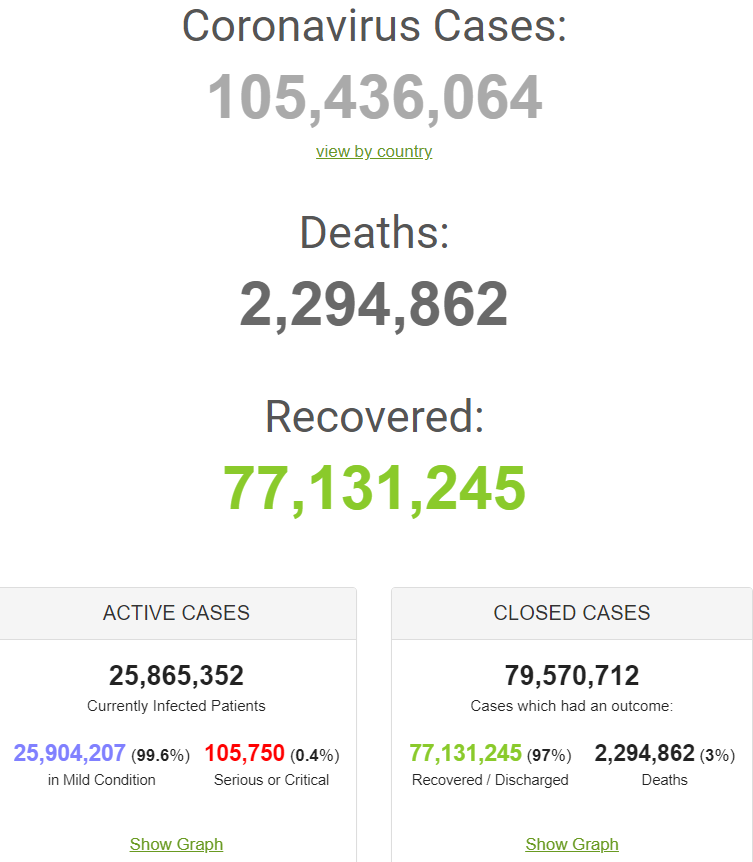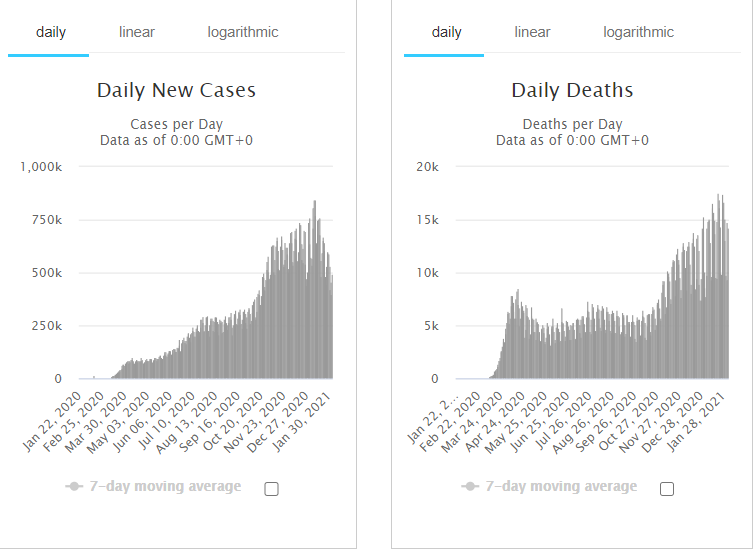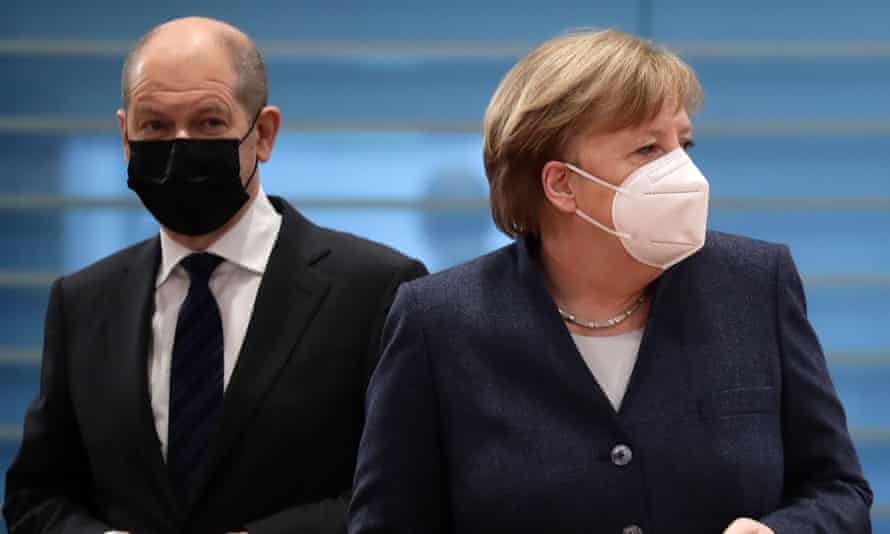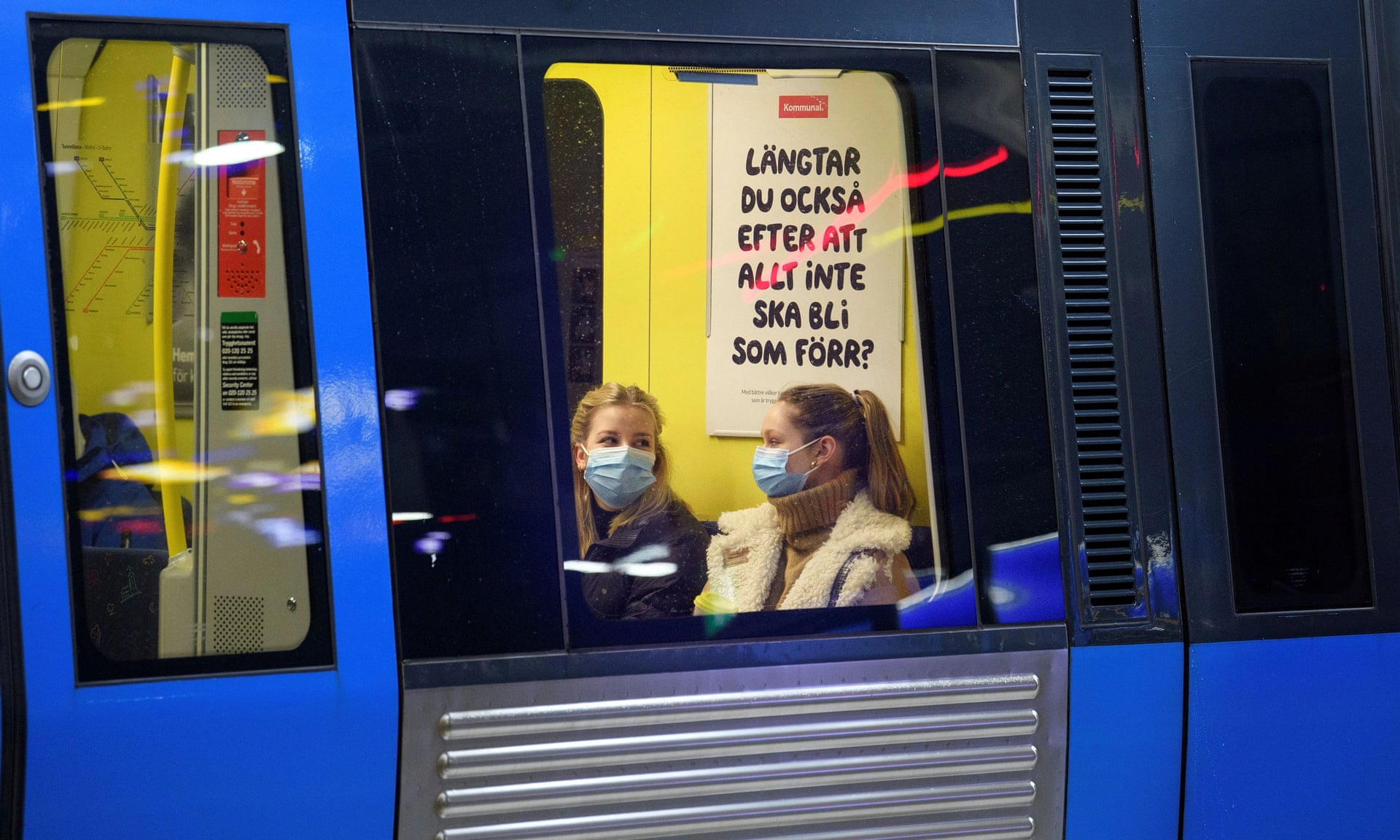
 i_need_contribute
i_need_contribute



|
Country, |
Total |
New |
Total |
|
World |
105,399,598 |
+505,482 |
2,292,749 |
|
27,273,890 |
+121,627 |
466,988 |
|
|
10,803,533 |
+12,410 |
154,862 |
|
|
9,397,769 |
+57,848 |
228,883 |
|
|
3,917,918 |
+16,714 |
75,205 |
|
|
3,892,459 |
+20,634 |
110,250 |
|
|
3,274,608 |
+23,448 |
77,952 |
|
|
2,943,349 |
+29,960 |
60,802 |
|
|
2,597,446 |
+13,659 |
90,241 |
|
|
2,508,988 |
+7,909 |
26,467 |
|
|
2,265,536 |
+12,989 |
60,885 |
|
|
2,135,412 |
+9,790 |
55,131 |
|
|
1,961,635 |
+8,891 |
48,700 |
|
|
1,886,245 |
+12,153 |
161,240 |
|
|
1,533,511 |
+6,496 |
38,344 |
|
|
1,466,767 |
+3,751 |
45,605 |
|
|
1,445,326 |
+7,040 |
58,256 |
|
|
1,232,246 |
+5,082 |
23,229 |
|
|
1,165,052 |
+6,715 |
41,753 |
|
|
1,123,105 |
+11,434 |
31,001 |
|
|
1,013,445 |
+9,651 |
16,911 |
|
|
993,430 |
+4,193 |
14,234 |
|
|
793,734 |
+4,083 |
20,513 |
|
|
748,858 |
+7,914 |
13,482 |
|
|
740,237 |
+3,592 |
18,731 |
|
|
738,152 |
+2,668 |
18,675 |
|
|
716,395 |
+3,124 |
21,216 |
|
|
675,618 |
+6,744 |
5,001 |
|
|
624,222 |
+1,150 |
13,091 |
|
|
550,540 |
+1,508 |
11,833 |
|
|
537,030 |
+485 |
8,175 |
|
|
531,699 |
+1,590 |
10,997 |
|
|
530,289 |
+1,765 |
9,556 |
|
|
473,667 |
+620 |
8,351 |
|
|
419,801 |
+1,518 |
7,936 |
|
|
402,700 |
+1,863 |
4,085 |
|
|
396,429 |
+2,593 |
6,020 |
|
|
371,988 |
+1,652 |
12,832 |
|
|
369,248 |
+303 |
6,389 |
|
|
331,768 |
+1,294 |
4,354 |
|
|
324,489 |
+1,107 |
5,391 |
|
|
316,875 |
+3,249 |
888 |
|
|
312,269 |
+3,107 |
3,397 |
|
|
271,602 |
+171 |
2,033 |
|
|
260,480 |
+583 |
3,240 |
|
|
256,903 |
+2,077 |
4,976 |
|
|
253,413 |
+1,708 |
1,755 |
|
|
253,339 |
+949 |
14,968 |
|
|
234,153 |
+516 |
5,106 |
|
|
231,483 |
+4,571 |
826 |
|
|
230,769 |
+152 |
3,148 |
|
|
222,447 |
+2,021 |
10,571 |
|
|
222,149 |
+883 |
9,272 |
|
|
218,948 |
+1,671 |
2,747 |
|
|
213,949 |
+1,270 |
7,048 |
|
|
200,744 |
+1,314 |
3,586 |
|
|
200,335 |
+553 |
2,184 |
|
|
195,992 |
+455 |
2,662 |
|
|
191,639 |
+1,280 |
2,476 |
|
|
184,948 |
+721 |
2,885 |
|
|
171,340 |
+1,239 |
3,580 |
|
|
168,250 |
+840 |
962 |
|
|
168,057 |
+532 |
9,512 |
|
|
167,568 |
+147 |
3,107 |
|
|
162,624 |
+982 |
3,497 |
|
|
161,665 |
+699 |
5,785 |
|
|
161,087 |
+661 |
1,865 |
|
|
160,935 |
+1,069 |
5,903 |
|
|
152,898 |
+407 |
249 |
|
|
151,103 |
+1,313 |
3,662 |
|
|
141,104 |
+177 |
3,163 |
|
|
140,157 |
+749 |
2,126 |
|
|
136,030 |
+1,340 |
1,632 |
|
|
136,023 |
+794 |
2,779 |
|
|
135,041 |
+185 |
1,532 |
|
|
128,775 |
+460 |
1,216 |
|
|
122,013 |
+770 |
1,919 |
|
|
108,381 |
+265 |
2,904 |
|
|
105,496 |
+704 |
377 |
|
|
101,339 |
+180 |
1,773 |
|
|
93,882 |
+372 |
2,900 |
|
|
89,649 |
+30 |
4,636 |
|
|
84,832 |
+70 |
1,418 |
|
|
81,993 |
+1,052 |
1,418 |
|
|
79,762 |
+451 |
1,448 |
|
|
78,916 |
+57 |
621 |
|
|
69,400 |
+742 |
1,281 |
|
|
69,255 |
+696 |
440 |
|
|
67,115 |
+706 |
339 |
|
|
64,212 |
+373 |
582 |
|
|
63,633 |
+515 |
826 |
|
|
59,624 |
+22 |
29 |
|
|
59,003 |
+1,514 |
812 |
|
|
55,821 |
+198 |
1,653 |
|
|
8,595 |
+39 |
158 |
|
|
7,134 |
+51 |
61 |
|
|
1,957 |
+46 |
35 |
Retrieved from: https://www.worldometers.info/coronavirus/
From CNN's Andrea Diaz

Dr. Anthony Fauci, director of the National Institute of Allergy and Infectious Diseases, speaks with reporters at the White House in Washington, DC, on January 21. Alex Brandon/AP
The coronavirus variant B.1.1.7, first identified in the UK, is already spreading in the United States -- and "might become dominant" in the country, said Dr. Anthony Fauci, head of the National Institute of Allergy and Infectious Diseases.
"A recent study from the UK showed that (the variant) might be somewhat more deadly in the sense of making people sicker and certainly leading to death more," Fauci told CNN on Thursday. "It might become dominant because it seems to be very efficient in spreading from person to person."
The only way to prevent the variants from becoming dominant is to stop them from spreading by following public health measures and getting as many people vaccinated as quickly as possible, Fauci said.
"We have a possibility, and the capability, of trying to stop them from becoming dominant," he added.
About the variant: The B.1.1.7 strain had been circulating in Kent, England, since at least September. It spreads 30-70% more easily than the original strand of the virus, according to Britain's chief scientific adviser Patrick Vallance.
UK scientists have also found a mutation in some samples of the variant, that could allow Covid-19 to escape antibody protection.
The variant has now been spotted in at least 70 countries, and most US states.
From CNN's Angus Watson in Melbourne
Measures to combat Covid-19 will be a feature of the 2022 and likely the 2023 Australian Open tennis tournaments, according to the organizer of the grand slam.
Tennis Australia CEO Craig Tiley told CNN that this year's measures for players -- including quarantine, social distancing and contact tracing -- are here to stay.
"We're in a pandemic and this is not going away tomorrow. In fact, I think we're going to be doing this again next year and potentially the year after, and we're going to have to manage through it, we've got to find ways to do it,” Tiley said.
In January, more than 1,000 people from 100 different countries arrived in Australia on 17 charter flights to take part in the Open, in what Tiley described as a "Herculean effort".
All participants were placed under 14 days quarantine on arrival, with 72 players forced into stricter arrangements after they were deemed close contacts of 10 positive cases.
Tiley said that no sporting competition would be possible in the near future without a strict quarantine scheme, including the Tokyo Olympics planned for July.
While the Olympics is a "whole different deal and scale," Tiley added the Tokyo 2020 Games organizers could take note of Tennis Australia's success in preparing for the Open, which begins on Monday.
From CNN's Jen Christensen
Johnson & Johnson officially asked the US Food and Drug Administration for an emergency use authorization of its Covid-19 vaccine Thursday.
"Today's submission for Emergency Use Authorization of our investigational single-shot COVID-19 vaccine is a pivotal step toward reducing the burden of disease for people globally and putting an end to the pandemic," Dr. Paul Stoffels, Chief Scientific Officer at Johnson & Johnson, said in a statement.
As the FDA looks at the results, it will schedule a public meeting of its Vaccines and Related Biological Products Advisory Committee, an independent group of experts who will also look at the data and make a recommendation that the agency takes into consideration when it makes a decision.
If the FDA decides to authorize the vaccine, next the US Centers for Disease Control and Prevention's Advisory Committee on Immunization Practices meets to discuss whether the vaccine should be given to Americans and if so, who should get it first.
This same regulatory process for Pfizer took a little over three weeks. For Moderna it was a little more than two.
One dose: The Johnson & Johnson vaccine is a little different than the other Covid-19 vaccines. The vaccine, made through a collaboration of J&J's vaccine division, Janssen Pharmaceutical, and Beth Israel Deaconess Medical Center in Boston, is delivered in a single shot. Pfizer and Moderna's require two. It's considered versatile since it is considered stable for up to three months kept in regular refrigerated temperatures and doesn't need the deep freeze like Pfizer's.
Johnson & Johnson's Covid-19 vaccine was shown to be 66% effective in preventing moderate and severe disease in a global Phase 3 trial, according to the company. The vaccine is 85% effective overall at preventing hospitalization and death in all regions where it was tested.
By Sui-Lee Wee

Administering shots developed by the Chinese company Sinovac Biotech at a school in Santiago, Chile, on Wednesday.Credit...Esteban Felix/Associated Press
A team of Chinese scientists has reported that a coronavirus vaccine made by the Beijing-based company Sinovac Biotech, which has already been rolled out in China and distributed to many developing countries, was shown in early-stage trials to be safe and to have stimulated an immune response in adults over 60.
The results from the Phase 1 and 2 trials, which included 494 volunteers over 60 years old, were published in the British medical journal The Lancet on Wednesday.
But the vaccine’s late-stage trial results have been marred by confusion. The problems have disappointed several governments that placed orders. Brazilian officials said the vaccine had an efficacy rate of just over 50 percent, although those who still became infected included people who showed only “very mild” symptoms.
The vaccine, called CoronaVac, which has been introduced in countries including Brazil, Chile Indonesia and Turkey, is one of two candidates that are being mass produced in China. The other is a shot made by Sinopharm, a state-owned vaccine maker. CoronaVac was created using a tried-and-tested technology that uses a weakened or killed virus to stimulate the immune system.
CoronaVac has been given to millions of people in China, even before the release of late-stage clinical trial data to show that the vaccine would be effective. Sinovac said on Wednesday that the regulator had accepted its filing for approval.
The trials on adults above 60 years old showed no serious side effects, according to the Lancet article. It said that most adverse reactions were mild and that pain at the injection site was the most reported symptom, followed by fever.
By Jan Hoffman

Black Americans younger than 45 are far more hesitant to get the vaccine than those 60 and older.Credit...Kenny Holston for The New York Times
Poll after poll has found that Black adults in the U.S. are more skeptical than white adults about Covid-19 vaccines, and that many are reluctant to get the shots. But a survey released Thursday suggests that the picture is not as simple as that. It found that Black Americans’ views of the vaccines actually vary sharply by age and gender.
Younger Black adults are far more hesitant to get the vaccine than their elders, according to the new survey of 1,340 respondents released by the National Foundation for Infectious Diseases. Only 38 percent of those aged 18 to 44 said they plan to get vaccinated, compared with 68 percent of those 60 and older group, according to the survey, which was conducted for the foundation by NORC at the University of Chicago, a nonpartisan research institute.
The results also found that Black women across all age groups were more uncertain about the vaccines than Black men are, with 33 percent of women having no plans to get a shot and 22 percent unsure, compared with 27 percent of men who say they won’t get one and 17 percent who are unsure.
The gender divide is especially wide among Black people aged 45 to 59: Only 43 percent of women in that group said they would get a Covid-19 shot, compared with 75 percent of men.
Experts say one reason older people may be more amenable to the vaccines is that they are more likely to be hospitalized or to die from Covid-19, while younger people, who are generally healthier, tend to feel less threatened by it.
Dr. Patricia N. Whitley-Williams, a pediatric infectious disease expert and president of the foundation, said that younger Black people are more vocal about their mistrust in part because of the recent string of racist episodes highlighted by the Black Lives Matter movement.
As for the gender divide, she said, “Women are often responsible for health care decisions in their families, so they are generally more worried, and seek out multiple sources of information about vaccines, including from social networks and social media, where there can be a lot of misinformation.”
Survey respondents expressed distrust of both the vaccines themselves and the way they are being distributed: Fewer than one in four said they were very confident that the shots were effective, and only one in six were very confident that the shots would be given out equitably. More than half said the American health care system either always or often treats people unfairly based on race or ethnicity, a sentiment that was most pronounced in Black adults under 30.
The survey found that Black adults were a bit more open to flu vaccines than to Covid-19 vaccines. While 49 percent of Black adults overall said they would get a Covid-19 vaccination, 54 percent said they had gotten a flu shot or planned to get one.
Retrieved from: https://www.nytimes.com/live/2021/02/04/world/covid-19-coronavirus/black-americans-are-sharply-divided-by-age-and-gender-over-covid-vaccines
By Jon Henley Europe correspondent

Olaf Scholz and Angela Merkel at a cabinet meeting on Wednesday. Photograph: Hayoung Jeon/EPA
Germany’s finance minister has attacked the European commission’s Covid vaccine strategy as “really shit”, Bild has reported, as Angela Merkel’s centre-left coalition partners seek to exploit anger over the issue before federal elections.
Olaf Scholz, who is also the vice-chancellor, reportedly criticised the commission president, Ursula von der Leyen, by name during a cabinet meeting on Monday, saying Berlin could not “let this shit repeat itself” and that the vaccine debacle was “a disgrace”.
Scholz is the most senior cabinet member from Germany’s Social Democratic party (SPD), the junior partners in Angela Merkel’s Christian Democratic Union (CDU)-led “grand coalition” for 12 of the past 16 years.
The SPD fiercely opposed the appointment of Von der Leyen, a former defence minister and longtime Merkel ally, as commission chief in 2019, describing her as an “inadequate and inappropriate candidate”.
With federal elections due in September, Merkel and her CDU health minister, Jens Spahn, are coming under increasingly heavy fire over the pace of the vaccine deployment in Germany, where just 3.2% of the population have so far received at least one dose.
By contrast, the UK has administered at least one dose to 15.7% of its residents, while several EU members including Denmark (5%), Ireland (4%), Spain (3.8%) and Italy (3.7%) are also outperforming Germany. The EU average is 3.16%.
This week Merkel defended the EU process, conceding that it “rankled” that others were vaccinating faster but insisting the bloc’s slower collective strategy was the right one. “A virus that affects us all cannot be defeated by one country alone,” she said.
The SPD, trailing in the polls on about 15% to the CDU’s 35%, is gambling on attacking its coalition partner by seeking to capitalise on popular frustration over the vaccination programme. Last month Scholz sent Spahn a four-page list of questions on the vaccine strategy.
Merkel and Spahn have been criticised for allowing the commission to take control of vaccine procurement, a move backed by the EU27 to avoid a repeat of the splits in the first wave of the pandemic when several member states blocked exports of protective equipment.
It was feared a similar approach to vaccines would have led to wealthy countries such as Germany, France and the Netherlands scooping up the lion’s share of doses while smaller ones such as Croatia and Slovakia inevitably lost out in a failure of EU solidarity.
The commission eventually ordered 2.3bn doses from six manufacturers, but with no experience of such a vast public procurement exercise it is seen as having handled negotiations more like trade talks, focusing on price and liability rather than investing in securing a maximum of shots as fast as possible.
That led to the EU’s orders being placed several months later than London’s and Washington’s, and in turn to supply shortfalls that have forced many EU members including Germany to temporarily halt their inoculation programmes.
Problems have been compounded by the European drug regulator’s longer approval process, production issues and delays in Pfizer/BioNTech and AstraZeneca shipments, and some states being ill-prepared for the doses that have arrived.
Retrieved from: https://www.theguardian.com/world/2021/feb/04/german-minister-criticises-von-der-leyen-over-covid-vaccines-disgrace
By Agence France-Presse in Stockholm

Passengers aboard an underground train in Stockholm, Sweden, which is to begin development of digital vaccine certificates for travel. Photograph: Tt News Agency/Reuters
Sweden has announced it is to start developing digital vaccine certificates, to be used for travel and potentially more, following a similar move by Denmark a day earlier.
The two Nordic countries have said the coronavirus vaccine certificates would be designed to enable citizens to travel abroad, but also hinted they could potentially be used to check whether someone was vaccinated if they were attending something like a sports or cultural event.
“With a digital vaccine certificate it will be quick and easy to prove a completed vaccination,” Sweden’s minister for digital development, Anders Ygeman, said in a statement.
The Swedish government said it hoped to have the infrastructure to issue digital certificates in place by June.
Denmark, which announced its programme a day earlier, said they would initially publish a registry online that could be accessed to check someone’s vaccination status, which it hopes to have in place in late February, while it develops a long-term technical solution.
While the Danish government said it would hold off a final decision on whether the “corona passports” could be used for more than just travel purposes – pending more research into whether vaccinated people could still transmit the virus – the aim is that it will “contribute to a gradual, sound and appropriate reopening of Denmark”.
“It is absolutely crucial, for us to be able to restart Danish society, that companies can get back on track,” the acting finance minister, Morten Bødskov, said in a statement.
Both countries also said that efforts would be made to make the national certificates compatible with international certificates being discussed at the World Health Organization and at the EU level.
The WHO has floated the idea of digital certificates for the vaccine in the past but in January said it was for the moment opposed to them being used as a requirement for travel.
European commission chief, Ursula von der Leyen, in January backed the idea of using certificates to identify people who have had the jab, but added that “whether that gives a priority or access to certain goods, this is a political and legal decision that has to be discussed on the European level”.
Christian Wigand, a spokesman for the commission, on Thursday reiterated to reporters that the issue had been “discussed at the last European council meeting between the heads of state and government and it was concluded that the work on a standardised, interoperable form of proof of vaccination for medical purposes should continue”.
Asked about whether countries could move forward individually, Wigand simply said that “we have always been pushing for more coordination, we will continue to do so, especially when it comes to travel and travel restrictions”.
Retrieved from: https://www.theguardian.com/world/2021/feb/04/sweden-and-denmark-plan-digital-vaccine-certificates-for-travel-covid
Here are the key developments from the last few hours:
· Johnson & Johnson has applied in the US for emergency use authorisation for its single-dose vaccine. The drugmaker’s application to the Food and Drug Administration follows its 29 January report in which it said the vaccine had a 66% rate of preventing infections in its large global trial.
· British ministers have been accused of being too slow to act after it was disclosed new coronavirus quarantine hotels will not come into force until mid-February. From 15 February, travellers returning to the UK from “red list” countries will have to quarantine in a government-approved facility for 10 days. Labour said it was “beyond comprehension” that it was taking so long to get the scheme up and running.
· South Korea has passed 80,000 infections as the government weighs whether to tighten coronavirus restrictions ahead of next week’s lunar new year celebrations.
· The US has recorded more than 40,000 deaths from Covid in the past two weeks, with concerns growing that parties linked to this Sunday’s culmination of the football season – the Super Bowl – may lead to another spike in infections.
· Mexico is reported to be running out of vaccines, as the government vaccine registration website crashed for a third day in a row. Mexico has received only about 760,000 doses of the Pfizer vaccine, and has only about 89,000 of those left, many of which are earmarked for second shots. It expects to get more Pfizer doses by mid-month, and as many as 400,000 Sputnik shots by the end of February, but they won’t be enough to vaccinate even the country’s 750,000 frontline health workers and represent a drop in the bucket for Mexico’s population of 126 million.
· China has reported the fewest new Covid cases in over a month, official data showed on Friday, suggesting that the latest wave of the disease is subsiding ahead of the key Lunar New Year holiday period set to begin next week.
· New Zealand said on Friday it will start receiving refugees again this month, nearly a year after it shut its borders to stop the spread of Covid-19. A group of 35 refugees will arrive in February, with about 210 refugees expected to enter the country by 30 June, Immigration New Zealand officials said.
· The number of Covid infections in Tokyo may have jumped ninefold since last summer, coronavirus antibody tests showed. Random testing in Japan’s capital in December showed that 0.91% of people had antibodies, compared with about 0.1% in a similar study in June, the health ministry said in a report on Friday.
· The French prime minister Jean Castex said that the coronavirus situation in France remained fragile but that for the moment ruled out a new national lockdown. Castex said the rate of infection had not significantly increased over the past two weeks, even if the pressure on French hospitals remained strong, and the country must stick with the current restrictions.
· China will donate 100,000 doses of Covid-19 vaccine to Congo Republic and forgive $13m in public debt, its ambassador to the country said. The ambassador, Ma Fulin, announced the measures after a meeting with Congo’s president, Denis Sassou Nguesso. He did not say which Chinese-developed vaccine would be provided, but the doses are enough to vaccinate 50,000 of Congo’s 5.1 million people. Ma said the Chinese government would also forgive all public Congolese debt that came due before the end of 2020, an estimated $13m.
Retrieved from: https://www.theguardian.com/world/live/2021/feb/05/coronavirus-live-news-us-records-40000-deaths-in-two-weeks-mexico-runs-out-of-vaccine